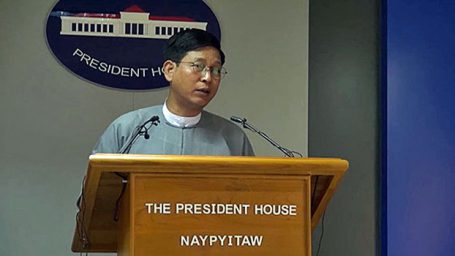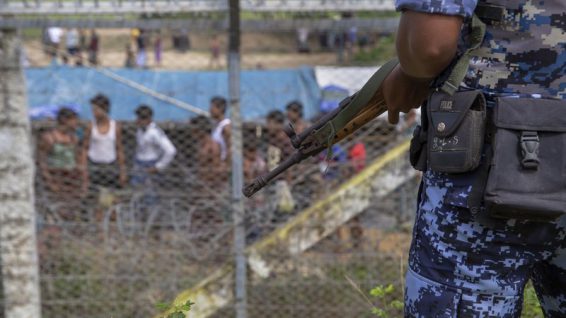By: Claudia Magloire & Derek Van Becelaere
Background
On September 6, 2018, a Pre-Trial Chamber of the International Criminal Court (ICC) issued its Decision on the Prosecutor’s request as to whether or not the Court has jurisdiction over the alleged deportation of Rohyinga persons from Myanmar to Bangladesh, finding that the Prosecutor should be allowed to open a preliminary examination into the situation. This is particularly significant because it marks the jurisdiction of the Court over a State which is not a party to the Rome Statute, nor was it referred to the Court by the U.N. Security Council, but it is engaging in conduct that affects ICC State Parties.
To read more about this Decision, see Part 1: Pre-Trial Chamber Grant Jurisdiction over Rohingya Deportation: One Step Closer to Accountability for these Atrocities.
However, there is contention among other ICC judges, various States, and prominent scholars as to whether or not this Decision was properly decided, and, in particular, if the Court had the power to decide their jurisdiction over crimes committed in Myanmar.
Myanmar
Unsurprisingly, Myanmar is opposed to the ICC exercising jurisdiction because, as it asserts, “Myanmar is not party to the Rome Statute and the Court has no jurisdiction on Myanmar whatsoever.” An official statement issued by the government of Myanmar on August 9th, prior to the Court’s Decision, elaborates on these arguments:
“… the Prosecution has incorrectly applied Article 19(3) request for a ruling from the Court on jurisdiction when the Court is not properly seized of the matter. Article 19(3) was intended to allow the Prosecutor to seek preliminary rulings on matters pertaining to jurisdiction and admissibility which arise in the normal conduct of proceedings ie. within a “situation”. In this matter, the Prosecutor has bypassed important procedural safeguards and instead used Art. 19(3) to request preliminary rulings on issues of jurisdiction prior to even initiating proposed cases within a “situation”.”
Significantly, Myanmar “also disagrees with the Prosecution’s assertion that population displacement across a national boundary is an essential objective element of the crime of deportation set out in Article 7(1)(d).” Furthermore, the statement stated that Myanmar was “concerned with the lack of fairness and transparency of the ICC proceedings,” disapproved of the Court’s decision to allow “unsolicited victims’ applications,” and argued that the Myanmar government’s Independent Commission of Enquiry meant that the Complementarity principle was violated by the Court exercising jurisdiction. The government warned:
“By allowing such a contrived procedure, the ICC may set a dangerous precedent whereby future populistic causes and complaints against non -State Parties to the Rome Statute may be litigated at the urging of biased stakeholders and non-governmental organizations and even then, selectively based on the political current of the times.”

Myanmar government spokesman Zaw Htay comments on the ICC’s Decision (Sept. 9)
The Issue of Territoriality
Much of the discussion on whether or not the Pre-Trial Chamber made the correct Decision turns on whether or not the territorial principle applies. The Pre-Trial Chamber held that deportation is a separate crime than forcible transfer and that it has a transboundary element. Ad hoc tribunals have consistently read the crimes as separate. Uncertainty remains regarding whether the crime is read to have a mens rea requirement for the cross-border element, as the Rome Statute has a specific intent requirement for each element of the crime.
The territorial principle is a fundamental principle of international law. There are two types of territoriality: subjective and objective. Subjective territoriality allows States to exercise jurisdiction when an offense is commenced inside that State’s sovereign territory. Objective territoriality applies more broadly, allowing States to assert jurisdiction over acts committed outside its borders if those acts have a substantial effect within its sovereign territory.
Reading the crime in the manner the ad hoc tribunals have done likely allows Bangladesh to assert territorial jurisdiction over the crime of deportation based on the subjective principle because the deportation has forced the Rohingya to cross into Bangladesh, thus establishing that part of the crime occurred within Bangladesh’s sovereign territory.
Theoretically, Bangladesh could also exercise jurisdiction under the objective principle because of the substantial effect that the atrocities in Myanmar have had on Bangladesh. Over 725,000 Rohingya refugees have fled to Bangladesh in the past year, creating extraordinary burdens on the Bangladeshi government, which is already a poor nation with resource issues which have been exacerbated by the mass influx. Bangladesh had to sign financing agreements totaling $200 million with the World Bank to restore the loss of nearly 13,000 hectares of forest that the influx of Rohingya has caused. UN aid agencies have also sought $950 million to provide humanitarian assistance and alleviate the severe economic strains on Bangladesh.

Refugee mother and son waiting to receive food at Kutupalong Refugee Camp in Bangladesh. © UNHCR/Andrew McConnell
Just because Bangladesh can assert jurisdiction over the crimes through the territorial principle does not necessarily mean that the ICC can assert its own. The question remains as to whether the ICC may transform the interstate notion of jurisdiction into an international notion of jurisdiction. In matters initiated proprio motu by the Prosecutor, the State consent regime is an added factor in determining proper exercises of jurisdiction. States that are not parties to the Rome Statute may refuse consent to jurisdiction for crimes committed on their sovereign territory. In this case, Myanmar is not a State party and has released a statement stating that it does not consent to ICC jurisdiction. This is an interstate notion of territorial jurisdiction that would traditionally involve negotiations and other interstate actions in order to promote relations between the States. It remains to be seen if the ICC can transform this jurisdiction, but the Pre-Trial Chamber’s decision suggest that it can do so.
The Pre-Trial Chamber appears to favor the more conservative subjective principle of territoriality. In its decision, the Pre-Trial Chamber acknowledged that “[i]f it were established that at least an element of another crime within the jurisdiction of the Court or part of such a crime is committed on the territory of a State Party, the Court might assert jurisdiction pursuant to article 12(2)(a) of the Statute,” such as the crime of persecution and the crime of other inhumane acts.
Other countries, including the United States, often exercise a similar type of criminal jurisdiction when one element of a crime occurs on their territory.
Read more about this in Part 4: Claiming Jurisdiction: Comparing the ICC Pre-Trial Chamber Decision Regarding Myanmar with Other Approaches
Judge Marc Perrin de Brichambaut’s Partial Dissent

© ICC-CPI/Max Koot
ICC Judge Marc Perrin de Brichambaut issued a partial dissent to the Majority Decision in which he contends that the Prosecutor should not have been able to bring her request before the Court. He emphasized the use of the term “case” in article 19(3) of the Rome Statute, which the Prosecutor used to empower her to request a ruling on jurisdiction. Judge Perrin de Brichambaut argued that the Prosecutor could only initiate such proceedings after she had initiated a case against Myanmar.
Did the Pre-Trial Chamber Rule Correctly?
The ICC must do what it can to preserve its legitimacy in the eyes of the public – especially today, with the global rise of nationalist parties that are hostile towards multilateral institutions like the ICC. In favoring the subjective territorial principle, the Pre-Trial Chamber appears to be finding the proper balance between respecting Myanmar’s sovereignty and seeking a just solution to the crisis. Had the Pre-Trial Chamber ruled that it could assert jurisdiction based on the objective territorial principle, States may have seen the move as an illegitimate expansion of the ICC’s jurisdiction.
It must also be acknowledged that an ICC investigation into this situation could have an impact on Bangladesh’s ability to negotiate a lasting solution to the problem with Myanmar. The two nations had been working towards a deal on repatriating the Rohingya, but it has yet to produce any significant breakthroughs. If the ICC asserts jurisdiction over Myanmar nationals due to Bangladesh’s status as a State Party to the Rome Statute, Myanmar could take a hardline stance on the issue that could hinder a lasting deal. Alternatively, however, Bangladesh could use its status to pressure Myanmar officials to more quickly resolve the situation.
It is also important to examine the procedure surrounding the Decision in determining whether it was correct. In his Partial Dissent, Judge Perrin de Brichambaut took issue with the stage at which the Prosecutor requested the opinion, noting that the interests of justice must be the top priority and that the Pre-Trial Chamber’s Decision is “tantamount to delivering a de facto advisory opinion” because it is “based on imprecise and selective submissions by the Prosecutor when there is not even a preliminary examination that has… been concluded.” Judge Perrin de Brichambaut emphasizes that for justice to be seen, the proper procedure must be followed. In his view, this would first require the Prosecutor to open a preliminary investigation, thus initiating a case.

Myanmar border guard police patrolling a fence in the “no man’s land” zone between Myanmar and Bangladesh. (Phyo Hein Kyaw/AFP/Getty Images)
It is certainly hard to disagree that it would be in interests of the ICC and the victims for the procedure to be followed properly. It would maintain the credibility of the ICC because States would know that the ICC takes the text of the Rome Statute seriously. In turn, it would make the ICC’s final rulings more legitimate because States would be less likely to see the case as a whole as illegitimate. Whether one believes proper procedure has been followed thus far depends on whether one agrees with the majority’s reading of Article 19(3) or that of Judge Perrin de Brichambaut.
For more on what might happen next, read Part 3 – What Comes Next: Procedure and Potential issues After Pre-Trial Chamber’s Ruling on Myanmar.
This series was created and edited under the direction of Harris Institute Fellow Madaline George.
